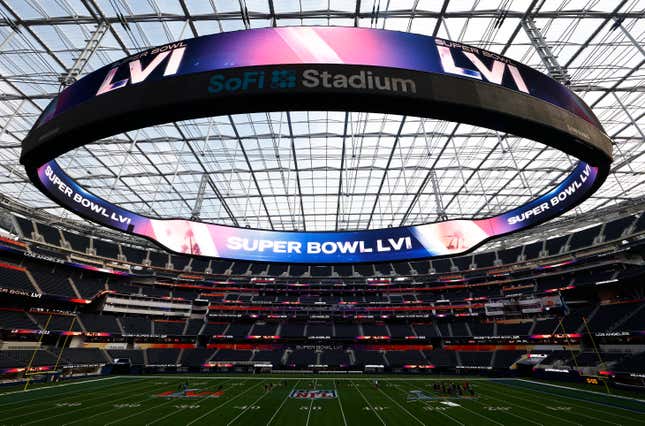
Super Bowl LVI—which takes place Sunday, February 13, in Inglewood, California—is swiftly approaching. And, once again, well-meaning media outlets, politicians, and social justice bystanders are amplifying the familiar narrative that the national sporting event fosters human trafficking, specifically sex trafficking, in its host city in the weeks leading up to the game. To date, though, no definitive data supports this assertion. In fact, some research—including studies from the Global Alliance Against Traffic in Women and the Arizona State University School of Social Work—makes it clear that sex trafficking is often conflated with sex work. Consequently, until we know more, or more resources are devoted to understanding the contours of the problem beyond its episodic appearance, we cannot know the full picture. Further, the largely media-driven incitement of moral panic and overpolicing too often leaves sex workers vulnerable to harassment, entrapment, and incarceration—all under the guise of making the world a safer place for women and girls.
But the world is not safe for Black women and girls. Alerted by drivers on January 8, 2022, California Highway Patrol officers found the body of Tioni Theus on the side of the 110 Freeway in South Los Angeles. The 16-year-old girl had been shot in the neck and discarded as if her life no longer held value—as if there were no one who loved her. The heart-wrenching discovery of Tioni’s body left her family to ask a painful question: “How does a 16-year-old girl end up shot on the side of the freeway and there’s little community outrage?” According to NBC Los Angeles, LA County District Attorney George Gascón said there is evidence Tioni “may have been the victim of human trafficking.” Court records indicated that the teen was identified as a victim of commercial sexual exploitation of children.
The Congressional Black Caucus report, Snapshot on the State of Black Women and Girls: Sex Trafficking in the U.S., cites the following findings from the Urban Institute’s Rights 4 Girls project:
- 57.5 percent of all juvenile prostitution arrests are Black children.
- In a two-year review of all suspected human trafficking incidents across the country, 40 percent of sex trafficking victims were Black women.
- In interviews compiled by the Urban Institute, traffickers admittedly believe trafficking Black women would land them less jail time than trafficking white women if caught.
The findings in the report make clear that discussions around trafficking are too often limited to the romanticization of white spaces, wealth, and leisure which erases the interconnectedness of poverty, age, and gender. Traditional Super Bowl coverage of the alleged increase in sex trafficking surrounding the big game may persist, but what’s far more momentous and newsworthy is the chronic toll of human trafficking—and the attendant dehumanization of Black women and girls—365 days a year. Due to the interconnected oppressions that Black women, cisgender and transgender, must navigate, it is clear that decriminalizing sex work is a racial issue that disproportionately impacts Black women in a system shot through with race, gender, and class power.
This matrix of power exists every other day of the year, even though concerns about trafficking and violence only become highly visible during this annual sporting event. The continued vilification of sex work, while positioning sex trafficking as something that only becomes urgent during major sporting events, illuminates the continued erasure of Black women and girls, making it plain who this nation believes to be worthy of safety, autonomy, and healthy choices. So, while we join efforts that use the yearly gridiron ritual to raise awareness of victims of trafficking, we also draw attention to the erasure of Black women—both the structural burdens that delimit their options and the choices they are left to make to build lives within them. This is what we must attend to every remaining day of the year.
We do not have the luxury of believing that Super Bowl-driven campaigns that overlook these deep-seated structural and racist practices can meaningfully address the plight of trafficked Black women and girls. Such an effort can only proceed by advancing public discourse that centers trafficking survivors and seeks to create a legal and socioeconomic infrastructure that supports their wholeness and well-being—while also calling out the racist, capitalist system that lays the groundwork for their victimization. At the African American Policy Forum, we understand that at the intersection of state and sexual violence too often lies the bodies of Black women and girls. We understand that the hypersexualization and adultification of Black girls is rooted in white supremacy and misogynoir. We understand that even though the Super Bowl may provide an obvious news hook for human trafficking reports, the endangerment and violent exploitation of Black women and girls happens in the shadows and in plain sight daily—not just behind the glare of stadium lights once a year.
On Sunday, we ask everyone who claims to care about safety for Black women and girls, protection of Black women and girls, and freedom for Black women and girls to stand with Tioni Theus’s family, the South LA community, and with AAPF as we continue to demand justice for her and all Black girls who have been violated and discarded while this nation plays on.

